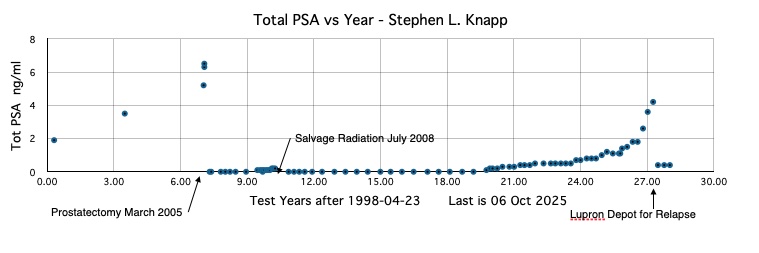
|
|
|
|
|
|
|
Steve Knapp's Home Page
|
Inside
|
Outside
|
Why Paul Krugman is a Hero and Role Model
Here are a few readers' comments regarding a blog column Krugman wrote on the subject of the responsibility of admitting when you were wrong: |
"What make Krugman, Krugman is that he really believes in himself. Then when he is wrong he is confident enough to say 'I was wrong'!" |
"One of the advantages of a large healthy ego such as yours (and mine) is that admitting error does not diminish self-esteem." |
|
I try to follow Krugman's example in this regard. |
Prostate Cancer Treatment and Follow Up:

Note: The danger blood concentration for PSA is generally set at or a bit below 4.0 ng/ml. At or above this level a 'Free PSA" test should be made to determine the need for a biopsy for adenocancer (prostate cancer cells). My cancer would have been detected sooner had I had a shorter interval between tests after 6/27/2001. Unfortunately, my family doctor retired just following that date, and I was not alerted to the need for frequent testing, say once a year. I hope this information helps other men, about 10% of whom will develop prostate cancer (many at more advanced ages). Prostate cancer treatment is moving very rapidly at the present time. With regard to the recent (2012) statistical finding that regular PSA testing results in mostly unnecessary treatments and deleterious side-effects, I seem to be the exception: the pathology conducted on my prostate tissues after surgery showed that the cancer had spread outside the prostate "capsule" and was therefore a serious threat. Given my relatively young age (62) at surgery and my overall good health (and lack of comorbidities), I regard myself as fortunate to have been treated. In 2017 my PSA began to rise. Fortunately relapse may be very slow, as shown in the graph. Eventually I will need further treatments. With my PSA increasing, in May 2025 I was put on long term androgen suppression with Lupron Depot. [I had undergone a one year course of Lupron following prostatectomy in 2005.] The initial PSA following the Lupron is encouraging. |